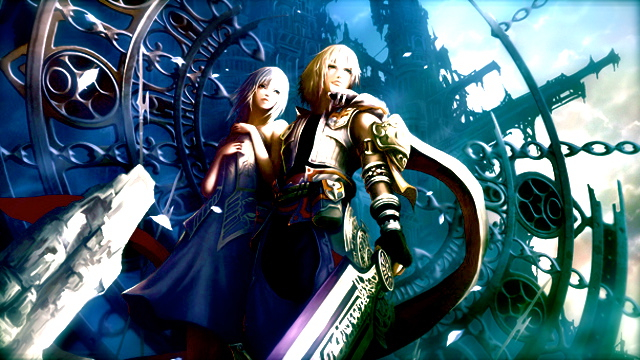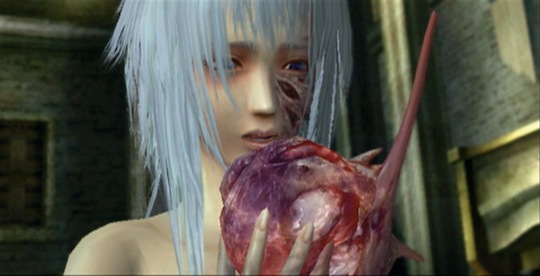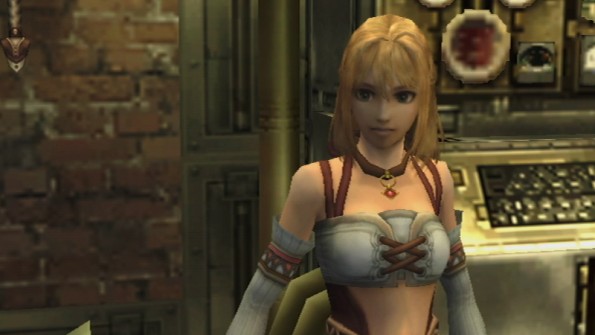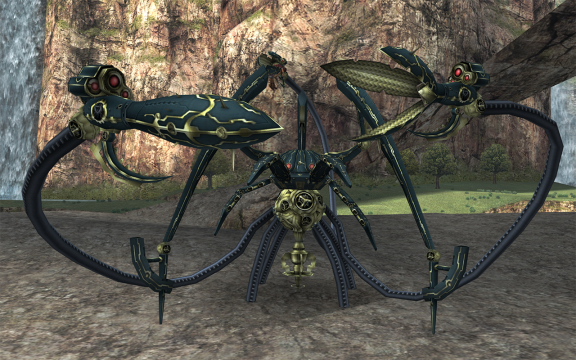
Warning: The following article contains slight spoilers for Xenoblade Chronicles and Pandora’s Tower.
We’ve all been there at some point or another. You’re playing a game, you’ve just been given an objective to save your sister, your dad, your girlfriend, your pet dog, you name it, and you’ve dared to ask the question, “Why?”. Why should I save these people? They’re not really my dad, my sister or my girlfriend. I have no connection to them whatsoever. Why are you asking me to do this, game? Give me a reason. Make me care.
It’s a valid question after all, and one that I’ve demanded an answer to many times in the past. The first time was probably back in the days of Goldeneye 007 on Nintendo 64. As every gamer from that era knows, Natalia was your worst nightmare; not only was she utterly infuriating, but she also repeatedly walked into your line of fire and got herself killed, thus automatically making you fail your mission. Forget her world-saving hacking skills– all you wanted was to put a bullet in the back of her head and be done with it.
Thankfully companion AI has drastically improved in the intervening years– thank you, Alyx Vance– but the dreaded “empathy problem” hasn’t gone away. Time and again it rears its ugly head, whether it’s a screeching Baby Mario in Yoshi’s Island, a ditzy Ashley from Resident Evil 4, or a nagging Navi, it just won’t go away. Sometimes it’s bad writing, other times it’s poor story-telling, but often it’s because we as players are so directly involved with the main protagonist. Their actions become our actions; their thoughts become our thoughts, and so on. But when a game tells us we should be feeling something we don’t, or says we should be doing something we don’t agree with, that’s when the empathy problem strikes. We disconnect, immersion is broken, and the magic of interactivity dies with it. Of course some games overcome the empathy problem better than others, but the game that had me asking “Why bother?” most recently was Pandora’s Tower.
I won’t go into great detail about the game’s storyline (just in case it does end up getting released in the US), but as I recently mentioned in my review, the game does something very unexpected for a JRPG. It breaks the genre habits of a lifetime and doesn’t burden you with huge cinematics or a long, complicated story– its opening cut-scene lasts less than four minutes, has almost no dialogue, and only reveals what we need to know: Elena’s cursed, the army’s after her, and Aeron needs to help her otherwise she’ll turn into a monster. That’s it. Before you can say angst-ridden teen, you’ve got the Oraclos Chain in your hand and you’re knee-deep in your first tower.

Yeesh, time to get some new moisturiser, Elena!
Compared to other JPRGs, it’s a very minimalist approach to story-telling. Admittedly it’s not quite as minimalist as The Last Story which takes all of 30 seconds to get going, but by way of comparison, Xenoblade Chronicles spends a good fifteen minutes “introducing” you to the game and its battle system before it starts the story proper. In this way, Pandora’s Tower was actually quite refreshing. There wasn’t any of this laborious “this is your girlfriend, you must save her because you supposedly care about her” malarkey; there’s just “here’s this girl Elena, she’s cursed, go get some monster flesh to save her”.
Yet for all its cut-scenes and prolonged preamble, I still feel that Xenoblade Chronicles is the undisputed winner when it comes to the empathy problem, because despite having the whole game at my feet within the first five minutes of booting it up, Pandora’s Tower still left me wondering “Why?” Why should I save Elena? Okay, so there’s the whole “she’s turning into an ugly purple slug monster” thing, but why Aeron (and by extension, me)? Why should Aeron and I care about what happens to her? In fact, the opening cut-scene doesn’t even mention Aeron’s name. As far as I was concerned, he was just “some guy” who seemed to be caught up in all this, making it even less apparent why he should be the one to step in and rescue her.
You may be wondering why something like this even matters– games like Super Mario Bros. never had to give players a reason to care about Princess Peach, so why is this such a problem with Pandora’s Tower? Well, a lot of it stems back to that old narrative desire chestnut, but the main reason why it matters (at least to me) is because the game still expected me to care, even if it wasn’t telling me I should in so many words. Throughout the entire opening cut-scene, you can see that Aeron cares about her, that there’s some kind of history between them, but the game was deliberately keeping their relationship under wraps and refusing to let me in on the secret. Even if it had resorted to telling me she was his girlfriend (or even just his friend), that would at least have given me something to work with, something I could base my understanding on. But instead it gave me nothing, and I found this even more frustrating than having character relationships shoved down my throat.
Let’s look at an example. While Xenoblade Chronicles is a little more in love with its cut-scenes, it definitely knows how to pack an emotional punch. Take Shulk and Fiora. Much like The Legend of Zelda: Skyward Sword, Shulk and Fiora are presented as childhood friends that may or may not have a slight thing for each other. Shulk is naively oblivious to the whole affair, but it’s pretty clear that Fiora’s his intended love interest. But even though we’re nudged and cajoled into accepting this because we have to, Xenoblade takes the time to show us why.

Oh Fiora, our time together was so bitter-sweet.
Everything from the scenes and dialogue they share to the support they give each other in battle shows us that they both care deeply about each other, romantically or otherwise. It pulls a similar trick to Skyward Sword, giving us just about enough time to start liking her before cruelly snatching her away from us, only this time it’s even more heart-wrenchingly painful. It’s not exactly on the same scale as the sudden death of Aeris in Final Fantasy VII, but we’ve spent enough time with Fiora to share in Shulk’s sorrow and mirror his feelings of revenge. We want to get Metal Face just as much as he does, and ba-da-bing, ba-da-boom, congratulations Xenoblade, you’ve also just kick-started your story with a super effective dose of narrative desire.
So giving us time to care is one thing that Xenoblade excels at, but oddly enough, Pandora’s Tower also does this really well. In between (or even during) towers, you’ve got nothing but time to get to know Elena, and the game’s slow drip-feed of information makes it constantly feel like there’s something more to find out about her and this weird world around you. The more I’ve played, the more I’ve come to care as I peel back the game’s secrets, and all my initial assumptions about Elena and her relationship with Aeron have been proved wrong so far.
As for the game’s wider mysteries, all we have to go on are little diary-like clues dotted about the towers, and it lets the player discover for themselves what kind of world they’re in. This is good story-telling, as it neither pushes or forces us to come to a particular conclusion. There’s room for our imagination and our own curiosity, empathy as well as apathy, and more importantly, it never forces us to care either. We can take in the story as we please or ignore it completely, and it also lets us decide how we want to pursue our relationship with Elena too, with the game’s ending depending on how much time we choose to spend with her.
In a way, then, I can understand why Pandora’s Tower is reluctant to tell us about her precise connection with Aeron, as pigeonholing it early on would wreck the rest of its good story-telling. Nevertheless, that still doesn’t excuse the fact that it makes us do all the donkey-work about caring in the first place. After all, time isn’t the only empathy tool available– actions works just as well, and this is another area where Xenoblade succeeds.

When will those kids learn not to touch the fancy death-machines, eh?
Without delving too much into the plot, a prime example early on is your first encounter with Juju in Gaur Plain. You’ve just discovered his smoking hover bike busted by the wayside, and then you spot him being chased by a hoard of monsters. Again, it’s a rather forced scenario, but battling to save him automatically makes you care at least a little about his well-being, especially when he runs off again moments later when he decides to take on the remaining Mechon in Colony 6 all on his own.
More importantly though, Juju’s antics introduce you to Sharla, his sister and head of the Colony 6 refugee camp (and let’s not forget eventual party member too). You may not really care about Juju in the long run, but you will care about Sharla (although this may be due to the sole fact that she’s your main party healer– more on that next time!). As you run after Juju, Sharla quickly becomes an integral part of your team. Before you had to rely on Shulk’s meagre healing powers, but with Sharla covering your back you can attempt larger and more formidable foes. She binds your whole team together, and then when she’s put in danger… Let’s just say those Mechon picked the wrong girl to mess with.
Of course, I’m not saying Pandora’s Tower should copy Xenoblade Chronicles. That would be silly. But I feel like there could have been something more to get me caring that little bit quicker. I sympathise with Elena, but not empathise, and that’s the key difference. It’s excruciating having to watch her stomach raw monster flesh over and over again, but Aeron cares from the outset– I don’t– and that’s where our problem lies.




 ShareThis
ShareThis







Nice article Katharine.
Whilst reading I couldn’t help but think what you would make of the “story” in Dark Souls and Demon’s before it. They both offer almost no context as to even who you the player are, and certainly no reasonable explanation as to why you are in this predicament.
Yet the world you traverse draws you in so much that the story or connection to NPC’s is not at the forefront of your thoughts. You just want to put it right.
Maybe Pandora’s Tower is trying to draw the player into the same feeling of desperation as you battle to save the girl. I have never played this game so could be totally wrong and the atmosphere is likely completely different to Dark Souls. But the thought still prevails.
I’m interested to see how it plays now!! :D